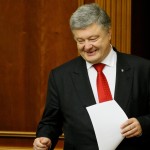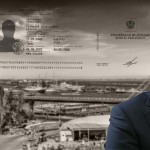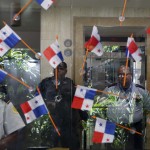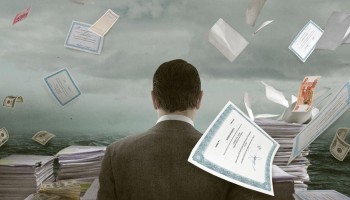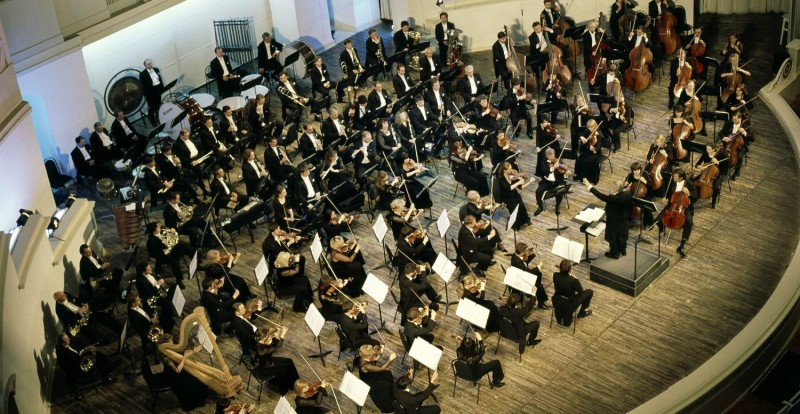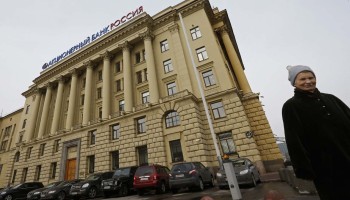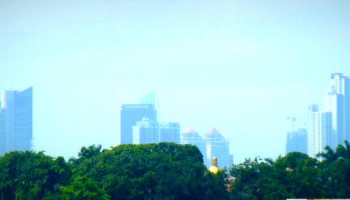As he walked on stage last week for a performance of the Moscow Philharmonic Orchestra in the Great Hall of the Conservatory, it was clear he was special. The casual black satin shirt and outdated hair gave him an air of nonchalance, but the musicians stood and the crowd applauded with respect.
As he launched into Ernest Bloch’s Schelomo, the musical voice of the Jewish King Solomon, his eyes closed as if in rapture, far away from the mundane cares of the world.
Afterwards he was mobbed by fans, one of whom tried to talk business. But the maestro stopped him. “Please, I’m so far from all this. See, even my cello is second-hand.” It’s a well-worn theme; the maestro told the New York Times in 2014, “I’m not a businessman, I don’t have millions.”
Sergey Roldugin leads a double life.
In his public life, he’s a recognized master musician, a Russian People's Artist and professor. His other incarnation is as a lifelong friend of Russian President Vladimir Putin. The ramifications of that life, until today, have been hidden from the world behind trusts and offshore companies that moved around billions of dollars, funneled “donations” from Russia’s richest businessmen into palaces and investments and controlled the activities of strategic Russian enterprises.
In a way, Roldugin has not been lying. He doesn’t have millions. He has billions.
How did a cellist manage to build this colossal offshore empire and is it really his? Novaya Gazeta reporters found some of the answer in the Panama Papers, documents obtained from a Panama-based offshore services provider called Mossack Fonseca. The documents were received by the German newspaper Süddeutsche Zeitung and shared by the International Consortium of Investigative Journalists (ICIJ) with the Organized Crime and Corruption Reporting Project (OCCRP) and Novaya Gazeta.
It was this investigation, which took more than a year to complete, that was targeted by the president’s press secretary Dmitry Peskov this week, calling it an “information attack against Vladimir Putin.”
The President’s Best Friend
Roldugin isn’t just a friend of the Russian leader, a status shared by many of Russia’s most financially successful people. He is perhaps Putin’s closest friend. In Putin’s best-known early biography, First Person: An Astonishingly Frank Self-Portrait by Russia’s President Vladimir Putin, Roldugin describes meeting the future president of Russia.
“Volodya (Putin’s nickname) studied with my brother. I lived in a different city and when I came to Leningrad, my brother told me about Vovka. … I think that was 1977. We met and then never split. He’s like a brother. Back in the day when I had nowhere to go, I went to him and slept and ate at his place. So, yeah, we met.”
In the book, Roldugin is mentioned more than almost anyone. He doesn’t just have insight into Putin’s life, he took active part in many of the most important events in it, starting in young manhood.
The inseparable pair backed each other up in street fights in Leningrad, then a rough city. They went AWOL together when Roldugin served in the army and would ride around Leningrad at night in a tiny, dingy Zaporozhets car, singing songs. They went to the theater together with “that cute girl Luda” before her last name was Putin.
He remembers Putin bringing his first, newborn daughter—Roldugin’s goddaughter--to a family dacha near Vyborg. “We went there and stayed together: Volodya, Luda, me, my wife … of course we celebrated Masha’s birth … We danced so hard in the evenings.”
Unlike Putin’s other friends, many of whom have joined the Forbes list of wealthiest Russians during his rule, Roldugin’s fortune remained unknown until today, except for a minority stake in Rossiya Bank, known widely as the “bank of the president’s friends.”
But thanks to the leaked documents from Mossack Fonseca, Novaya Gazeta reporters discovered that Roldugin’s offshore companies likely received money from companies close to the Russian oligarchy: the Rotenberg family, Suleiman Kerimov, Alexei Mordashov and other big businessmen across the country.
Roldugin, the humble musician earned tens of millions of rubles per day from deals that experts say are fictitious, often using the stock of Russian state-owned companies. Then they invested these funds into strategic assets in the country and personal “fun” projects connected to Putin’s relatives and friends.
An Offshore Empire
Roldugin controlled directly or indirectly a group of affiliated companies that controlled a significant share of a business empire that usually did one of three things:
dubious over-the-counter transactions with shares of the largest state-owned Russian companies such as Rosneft;
“donations” from major Russian businessmen often laundered through paper deals;
or preferential loans from the Cyprus-based RCB Bank, a large stake of which is controlled by the Russian state-owned VTB Bank.
Records from Mossack Fonseca show that Roldugin owned Sonnette Overseas from 2007 until 2012 in the British Virgin Islands (BVI) and International Media Overseas (IMO) in Panama. In these two companies, Roldugin was represented by St. Petersburg businessmen Oleg Gordin and Aleksander Plekhov, both of whom are affiliated with the heads of Rossiya Bank. Plekhov and Gordin, in turn, were stockholders in the BVI-registered companies Sandalwood Continental and Sunbarn Ltd. (see chart for details).
Each offshore had its own role in a larger scheme. Some took out unsecured and, according to experts, suspicious loans from RCB Bank, and then redistributed funds to other companies for various uses. Others were used to control large stakes in Russian companies. Still others played technical roles, serving as conduits for money or places where uncollectible debts were dumped.
Together, the companies all worked in a coordinated network in a scheme run by the same people in Rossiya Bank, owned by Putin’s closest friends and relatives. The documents from various businesses were often sent together in one bundle implying their work was coordinated. Many transactions were carried out and signed in a single day.
Where’s the money from?
According to the Mossack Fonseca documents analyzed by journalists from various organizations, the combined turnover from 2009 until 2012 of Sandalwood Continental alone was around US$ 2 billion. The 2009 reports state that its assets were valued at almost 18 billion rubles (US$ 266 million). The turnover of other companies was smaller, but still in the hundreds of millions of dollars. But where did they get so much money?
“Selling” stock
Much of it came from simple stock and contract manipulation of Russian state companies.
For example, in 2010 Rodulgin’s Panamanian company, IMO, agreed to buy Rosneft shares from another offshore company (Dino Capital S.A.). The lawyers handling Roldugin’s business sent two contracts to Mossack Fonseca on the same day. One was for the purchase of stock, and the other cancelled the first contract. According to the contract, Rodulgin would earn US$ 750,000 if the deal did not go through, which he in fact did since both contracts were executed at the same time.
There were similar deals with other companies affiliated with Roldugin according to email exchanges in the Mossack Fonseca data. These operations allowed the president’s old friend to make millions of dollars out of thin air. The technique is a tried-and-true scam used in Russia for years to launder money, pay bribes or reward friends. (Curiously, a similar approach, non-performance of contracts for purchase and sale of shares, was used by the fraudsters in the Magnitsky case, to create fictional obligations and then steal the profit tax from the budget).
In some cases the agreements did not involve a cancellation penalty but a stock trade, but in every one of these cases reviewed by Novaya Gazeta, the cellist earned a profit from the trade, which is highly unusual. His company bought stock in Russian companies and the next day sold the same stock back to the same people, but at a serious profit, which allowed them to make $400,000-500,000. Roldugin’s contracting partners always lost in these operations.
Roldugin’s managers seemed to know ahead of time how the market would act, and how the price of a stock would change. But it wasn’t due to their skill.
Novaya Gazeta talked to experts who said that, in reality, many of these deals may not have ever been done. Instead, deals like this are often just fake paper trails to explain payments from other sources.
Some of these companies were initially connected to the Troika Dialog investment fund, which was controlled and run by Sberbank after the bank bought the Troika Dialog investment bank. Troika and Sberbank declined to comment.
Mossack Fonseca never reacted or raised any serious questions to the activities of these offshore that were documented in the file.
Reporters from the Swiss newspaper Sonntagszeitung showed documents from these deals to Mark Pieth, Professor of Criminal Law and Criminology at the University of Basel and a former member of the Financial Action Task Force on Money Laundering.
“These Transactions are highly suspicious. They should raise every red flag possible for a bank. Especially if there are Russian parties involved and even more so, if one of them is a close friend of President Putin,” he said.
Kęstutis Jucevičius, the head of the Lithuanian Financial Crime Investigation Service, was adamant: “These operations have signs of illegal activity, maybe money laundering,” he told the Lithuanian website 15min.lt. Some of these operations went through the Lithuanian bank Ukio.
One reason the banks did not react to these suspicious transactions was because Roldugin’s companies held the money in foreign subsidiaries of Russian banks, which, according to documents, didn’t fully follow client-vetting procedures.
For example, when IMO opened an account in 2014 in the Swiss subsidiary of Gazprombank, Roldugin, as a beneficiary, had to disclose whether he was a PEP (Politically Exposed Person), or acquainted with a PEP. In both cases the Russian cellist said “no”, even though the information that he was friends with Putin was well-documented publicly.
According to expert Pieth, Gazprombank should have followed Swiss law and verified Roldugin’s claims.
“But there is no sign what so ever that this has been done. If they had, the bank would probably have refused to open an account for the client. If the Bank accepted the false declaration about the Background of the client, it would have violated Swiss law.” Pieth says.
“Donations” from businessmen.
The ways important Russian businessmen interacted with Roldugin’s companies are reminiscent of those described in 2010 by Sergey Kolesnikov, who worked for friends of the Russian president responsible for building “Putin’s Palace” in Gelendzhik, a lavish, royal Italianate palace overlooking the Black Sea.
After Kolesnikov left Russia, he wrote an open letter to then-president Dmitry Medvedev where he explained that Russian oligarchs made donations to the president, and 35 percent of that money moved into offshore accounts. In Roldugin’s case, the payments were not literal donations, but transactions of such dubious financial usefulness that they might be considered direct payments. Here are a few striking examples:
In July 2007, Roldugin’s company Sonnette Overseas received a loan from another offshore company, Levens Trading, for US$ 6 million at a 2 percent yearly interest rate. And just about one month later, the creditor, for a repayment of US$ 1, forgave Roldugin’s debt. Levens Trading is connected to Russian businessman Alexey Mordashov. According to data from the Russian company register (USRLE), this offshore company owned 100 percent of Severstal Vtormet, a major scrap steel company.
Other companies close to Mordashov made payments to Roldugin related companies too. For example, in 2009-2010, the Rodulgin-connected Sunbarn Ltd. signed several contracts for consulting services totaling US$ 30 million with the offshore companies Jabiru Consultants and Pearl Kite Trading.
According to these contracts, Sunbarn Ltd. was supposed to provide information "about investment opportunities in Russia.” At least one of the companies that paid, Jabiru Consultants, was previously a shareholder in Mordashov’s Severstal structures.
Mordashov was mentioned in Kolesnikov’s letter as one of the businessmen that donated money to Putin’s friends. Mordashov declined to discuss the Roldugin deals with reporters.
The Mossack Fonseca data includes emails which contain contracts to provide loans to Sunbarn Ltd. from three offshore structures owned by Putin’s close friend and sparring partner, Arkadiy Rotenberg, and his son Igor. In 2016, Arkadiy Rotenberg was first on the Forbes list of the biggest state contractors with a total sum of state contracts at 555 billion rubles (US $8.2 billion).
The contracts are all dated on April 25, 2013, and say that the Rodulgin-connected company Sunbarn Ltd. would receive a US$ 185 million loan for 10 years at 2 percent interest from Rotenberg. There are no other documents regarding this issue in the database, so it’s not clear if the agreements were enacted. Rotenberg refused to answer questions from Novaya Gazeta.
Companies connected to another major Russian businessman, Suleiman Kerimov, also made indirect payments to a Roldugin-connected offshore. In two complex deals with Kerimov companies, Roldugin effectively received the rights to receive 4 billion rubles (US$ 59 million) and US$ 200 million respectively for a payment of just US$ 2.
How this happened was tricky.
In 2007, Tokido Holdings, an offshore company, loaned 4 billion rubles to National Telecommunications JSC (NTC), the largest Russian operator of cable TV and Internet. At that time NTC, belonged to Kerimov’s Nafta group. In 2008, Kerimov sold NTC to the National Media Group that belongs to Rossiya Bank, the bank of “the president’s friends”. But the debt to Tokido Holdings wasn’t paid off at that time.
And then on a single day, Sept. 20, 2010, two deals were made. First, Tokido Holdings passed the rights to claim the 4 billion rubles owed by NTC to another offshore company, Desmin Holdings. Desmin sold the same right to Sandalwood Continental, connected to Roldugin, for US $1. In 2011-2012, NTC was bought by the state company Rostelecom. And Rostelcom ultimately paid off the 4-billion-ruble debt giving Roldugin a mighty windfall for a $1 investment.
A similar scheme was enacted with another US$ 200 million loan from the very same Tokido Holding. Also in 2010, this debt was passed on from one offshore to another, until it ended up with Roldugin’s Sandalwood Continental, which, after paying US$ 1, received the right to claim $200 million.
Such deals also took place with companies other than Kerimov’s. For example in 2011 Roldugin’s IMO paid US$ 1 for the right to demand another US$ 200 million from another BVI offshore, Ove Financial Corp. Reporters could not determine who was behind that company.
Bank loans
Another important source of finance for Roldugin’s offshore group were loans from the Cyprus-based RCB Bank, controlled by Russia’s state-run bank, VTB. The documents say that from 2010 through 2012, a credit line for a minimum of US$ 650 million was opened for Sandalwood Continental. The deal gave the offshore almost unlimited access to cash for any purpose.
At the same time, credit agreements were signed in such a way that even Mossack Fonseca lawyers pondered the question of whether the bank would get that money back. Mossack Fonseca employees exchanged worried emails questioning whether such a contract should be signed especially when there was no clear understanding of the purpose of the loan and no collateral was put up.
“These Loans do not seem to have a commercial background. There is no adequate security mentioned, something that normally would be written in the agreement,” said financial crime expert Pieth. In most of the loan contracts in the data, there’s no mention of security or collateral for the loans. Roldugin’s company, without any risk, received hundreds of millions of dollars from a subsidiary of a Russian state bank.
A representative of RCB Bank told ICIJ that the bank follows all laws in its operation, so the «the assumption that RCB Bank Ltd is a so-called “pocket” for highly-ranked Russian officials is utterly unfounded and certainly does not correspond to the actual state of affairs” Besides that, the bank notes that it voluntarily handed over a request from ICIJ to the body responsible for fighting money laundering in Cyprus, for independent investigation.
According to Pieth, the deals are reminiscent of those used by former Russian Communications Minister Leonid Reiman, whom European law enforcement bodies suspected of money laundering. “The Minister was a friend of Putin as well and the deals took place between 2007 to 2008. The agreements in this case look like they are from the same scheme,” said Pieth.
Where did the Money Go?
Part of the fortune in Roldugin’s name accumulated by his offshore companies was invested in Russia. These investments can be divided into two groups: for fun, such as resorts, yacht clubs, and palaces; and for purchasing strategic assets.
In 2011, Roldugin’s Sandalwood Continental lent around 200 million rubles (about US$ 3 million) in two loans to the Russian company Ozon. These contracts had “friendly” conditions. One of the loans was for 10 years, the other for 20 years, both at an annual rate of 1 percent.
The next year, in 2012, Ozon acquired a large piece of land in the Priozersk district of the Leningrad region. Today, it’s the location of the mountain ski resort Igora. Last year, Reuters reported that this was the location of the February 2013 wedding of Putin’s daughter Katerina Tikhonova and Kirill Shamalov, son of the long-time Putin friend Nikolai Shamalov.
Also in 2011, Sandalwood Continental lent 40 million rubles (about US$ 590,000) on the same “gentlemanly” terms to another Russian company, Laguna. Laguna has the same address as the Igora mountain ski resort. The company itself owns a yacht club on the shore of Lake Ladoga.
Sandalwood Continental also loaned around 50 million rubles (US$ 737,000), again on favorable terms, to Nord Haus, a company that owns land and a hotel complex in the city of Sortavala, Republic of Karelia. Today this real estate, according to Rosreestr (the Federal Service for State Registration, Cadastre and Cartography), is owned by Dacha Vintera Ltd.
Local blogs in Sortavala report that this is the planned location of a holiday house for Putin, but there has not been any official announcement or proof.
All these Russian companies are connected, in one way or another, to Rossiya Bank and its co-owner, Yuri Kovalchuk, an old friend of the president. Representatives of Kovalchuk declined to answer ICIJ’s questions.
Strategic assets
Roldugin’s offshore companies controlled stakes in the country’s largest companies, including truck production and TV advertisement sales.
Video International (VI) is Russia’s largest seller of television ads controlling some 70 percent of the advertising market at one point. It was founded by Mikhail Lesin, the former Minister of Press, and a presidential advisor. Lesin died last November under suspicious circumstances in a Dupont Circle hotel in Washington DC and authorities are investigating the matter.
In 2010, business trade publications in Russia reported that VI was bought by Rossiya Bank. This purchase was preceded by a new law that affected the value of the company by restricting the amount one company could own to 35 percent, half of VI’s existing share of the market. Rossiya bank bought control of the company after its value dropped. Among the buyers were Roldugin’s offshore companies.
According to Rosstat (Russian Federal State Statistics Service), 20 percent of Vi belongs to the Cyprus-based Med Media Network. The Mossack Fonseca database reveals the sole owner of Med Media Network is Roldugin’s IMO. When IMO opened an account in the Swiss Gazprombank, Med Media Network was noted as the company’s only subsidiary. An account opening memo noted that Med Media Network has to pay almost 270 million rubles (US$ 4 million) in dividends to its parent company.
Vi did not answer reporters’ questions.
Trucks
For many years a large stake in KamAZ, the largest producer of trucks in Russia, was owned by Cyprus-based Avtoinvest Ltd., owned by the Troika Dialog investment fund. In 2008, Troika increased its stake in the truck manufacturer to almost 51 percent. But the Mossack Fonseca documents show Troika used several hidden agreements to give away much of its interest to more influential players including Roldugin.
In 2007 Troika handed over all the rights for managing Avtoinvest Ltd. to an offshore company named Avto Holdings Ltd. According to the agreement, Avto Holdings got the right to participate in Avtoinvest shareholders meetings, appoint and dismiss the director and to take 95 percent of the dividends. Basically, one of the main KamAZ stakeholders gave control away to an unknown offshore. And 15 percent of that unknown offshore belonged to the cellist Roldugin through his company, Sonnette Overseas.
Avto Holdings also had a secret 10-year option agreement to buy 100 percent of Avtoinvest for just $100,000 allowing them to control the lagest KamAZ stakeholder.
Similar agreements between Troika and offshore companies affiliated with Roldugin existed regarding the stock of AvtoVAZ, which manufactures the iconic Lada car. These agreements were different just in dates, names of the companies, stakes and sums of money. But the point remained: offshore companies affiliated with Putin’s friend had privileged rights to control large stakes in strategic Russian enterprises, to receive dividends, and to buy these stakes for laughable sums.
The Kremlin declined to substantially answer questions related to this investigation.
Instead Dmitry Peskov, Putin’s press secretary, called a special briefing where he warned of what he called “an attack on the president.” “We’ve received documents from an organization that calls itself an international consortium of journalistic investigations, which includes various publications and journalists from various countries. We’re confident that it’s not just journalists, but representatives of other organizations and services. They’re planning to publish some new opuses in the next few days in Germany, the US, UK, France, Switzerland, Russia and several other countries. We consider these articles to be “zakhazukha” (a paid article), Peskov said.
Rodulgin Responds
Reporters from Novaya Gazeta met Roldugin after his concert and the cellist invited them into his dressing room. When they asked him about offshore companies, he thoughtfully dodged the question: “Guys, honestly, I can’t comment at this time. I have to take a look and find out what I can say and what I can’t.”
“I understand the topic is serious. Do you do business or not? Where’s the money from? Whose are they? I know all this. This is all delicate,” the cellist said.
Reporters asked Roldugin about specific offshore companies, as well as their deals with well- known Russian companies such as KamAZ, the AvtoVAZ, Vi and others, and whether he had anything to do with it.
“I was connected to this business long ago. Before Perestroika. It happened. And then it grew and these things happened,” he said.
However, most of these transactions occurred between 2006 and 2009, many years after perestroika.
“This money is also used to subsidize the House of Music,” he said, referring to a music school where Roldugin serves as director in St Petersburg. He promised to talk to reporters in a few days but did not answer calls after that.
Novaya Gazeta asked a person from Roldugin’s circle for one word to characterize the famous Russian cellist. Without hesitation he replied: “Call him the ‘caretaker’. That works”.

